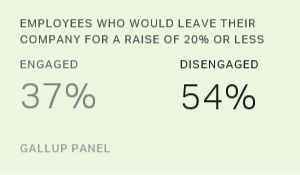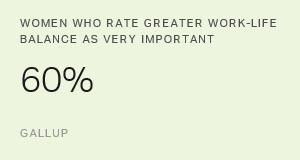Story Highlights
- Money only improves well-being to a certain point
- Still, many workers would consider leaving for higher pay
- Leaders can take steps to combat the salary problem
Many employees have played this numbers game: "Would you leave a job you love for a $1 million bump in annual salary? How about for $500,000? $100,000? $20,000?"
And many have reached conclusions that their employers wouldn't be too excited about.
In a 2015 article, CNN Money reported that "minimal wage growth" is one of the top three reasons that workers in Europe, Asia and North America cite for leaving their jobs. And though the average annual raise in 2014 for U.S. employees was 3%, Forbes estimates that the average boost in pay received by workers who leave a company for a new position is 10% to 20%.
It's no surprise that money matters to employees, and unfortunately for employers, many have considered leaving for more of it. Though many leaders recognize that money is important, they may wonder: What would it take for their top performers to leave for a better salary? How much does money matter?
The Magic Number: $75,000
In their report on high income and emotional well-being, Nobel Prize winners Daniel Kahneman, Ph.D., and Angus Deaton, Ph.D. (former and current Gallup senior scientists, respectively) discuss whether "money buys happiness" and examine the relationship between experiencing daily emotions and annual household income. They found that experiencing significant amounts of happiness or stress on any given day improves with income, but only up to an annual household income of about $75,000, regardless of geographic location. That is, people with annual household incomes of more than $75,000 don't have commensurately higher levels of this type of emotional well-being, though their general life evaluations continue to increase.
Put another way: Money can improve daily emotions, but only up to a certain point. Once employees reach that plateau, this element of their emotional well-being doesn't get commensurately higher, no matter how much more they make.
The problem for employers is that most workers aren't aware of the income ceiling on emotional well-being. Gallup finds that 44% of employees say they would consider taking a job with a different company for a raise of 20% or less.
Money is a powerful draw for workers. Yet there are tangible actions -- other than simply increasing pay -- that leaders can take to keep workers around.
Engaged Employees Are Less Likely to Consider Leaving
When employees are actively disengaged, the percentage who would consider leaving for a raise of 20% or less increases to 54%. On the other hand, when employees are fully engaged -- when they feel involved in, enthusiastic about and committed to their work -- the percentage who would consider leaving for a raise of 20% or less drops to 37%, or by slightly more than 30% compared with actively disengaged workers. The majority of actively disengaged workers are likely to bolt for almost any raise, while the majority of engaged workers would require more than a 20% raise to leave their current company.

Engaged employees work with passion and feel a profound connection to their company. By ensuring employees' basic needs are met -- for example, that they have a manager who encourages their development and focuses on their strengths -- leaders create a culture of engagement in which employees are more likely to want to stay, even if a more lucrative offer is on the table.
High Employee Well-Being Can Improve Retention
Engaging employees is a good first step to retaining them. But finances are only one element of a person's well-being, and there's more that leaders can do to improve employee well-being than raising their salary. By holistically improving all aspects of employees' well-being -- purpose, social, financial, community and physical -- leaders can help their employees lead better lives, which in turn can help businesses improve performance outcomes.
Gallup classifies people as thriving, struggling or suffering in each element according to how they rate that particular facet of well-being in their lives across several scientifically designed and validated metrics. When employees are engaged and thriving in at least four well-being elements, they are 42% more likely to evaluate their overall lives highly and 59% less likely to look for a job with a different organization in the next 12 months. By including well-being principles in their companies' engagement programs, leaders can make a substantial difference in their employees' lives.
The bottom line is that money matters and all workers want to be paid competitively. But to employ the smartest salary strategy, leaders need to go beyond increasing pay. By ensuring that workers are fully engaged and by focusing on holistic employee well-being, leaders can meet the needs of their employees, encourage them to stay and improve organizational performance.
Sangeeta Agrawal contributed to the research in this story.
